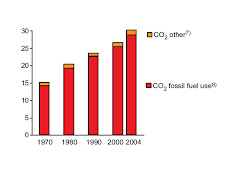Just the title of the book tells how global warming can become a major issue in our culture: passion and politics. For me, passion is what motivates me to act and inform others. These are answer that I have already explored in my blog, so I will include more general information and statistics from this book.
"In 2100, the Earth could be very hot, with temperatures up 10 degrees Fahrenheit on average. Combined with mass extinctions, post-peak-oil, poverty, water shortages, and a reversion to tribalistic politics, all this might leave our descendants suffering. Or perhaps, a world rewired with clean-energy technology, a globalization that raises the mas of humanity toward a decent standard of living, and a new newfound and profound respect for the remains of creation will carry humanity forward into a new era of progress" (Goodstein 8). Another major motivation for people is what their children and grandchildren will have to deal with. The problems in our world that we are dealing with now will be so much worse in a century. This fact is why climate change needs to a central cultural issue of my generation. We can not fathom what will come. If people are confronted with these facts, government policies, and compelling reasons, we will be on the path that will make our world a better place. By acting and fighting, we will be making history. As Goodstein writes, "What a time to be alive" (Goodstein 9). We are faced with the tremendous opportunity to save our planet: the coral reefs, the arctic, the polar bears, the birds, and us.
In the Solutions section of this book, Goodstein says that "Rich countries need to meet the Kyoto targets by reducing CO2 emissions to 5 percent below 1990 level by 2010, and then cut emissions by a whopping 90 percent by the end of the century" (Goodstein 126). But, one of the largest CO2 emitters in the world is the U.S.. We produce 23% of gasses emitted. Furthermore, we are not part of the Kyoto treaty. Like I have said before, there needs to be international cooperation. The U.S. has to be an active participant in global agreements. The world needs to unite. This is how we will fight and win.
The rest of the Solutions chapter talks about how we need to use renewable energy, like wind and solar power. Also, we the government "to invest in research and devlopment and provide production incentives, so that as economies of scale kick in, these clean alternative become cost competitive" (Goodstein 127). Again, this relates back to what Jared told be, and what I have found throughout by research.
Subscribe to:
Post Comments (Atom)



No comments:
Post a Comment